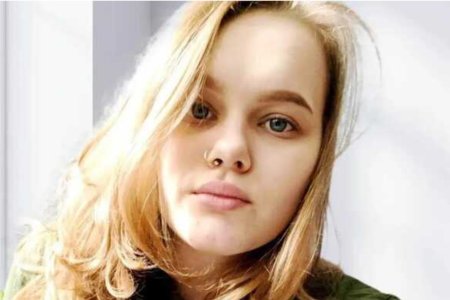
A court in Kaliningrad has found Illya Hibeskul guilty of ‘justifying terrorism’ in a series of social media reposts which the young man could not have himself posted. The sentence, however, was unexpectedly ‘lenient’ with the judge having doubtless understood the absurdity of the charges. Only 19 when seized by Russia’s FSB, Hibeskul had been imprisoned for almost a year when released in the courtroom on 28 February.
The ‘trial’ took place at the Baltic Fleet military court in Kaliningrad, with the hearing on 28 February seemingly the first and last, after two earlier ones were cancelled The charge under Article 205.2 § 2 covers supposed ‘public calls to carry out terrorist activities; public justification of terrorism; or propaganda of terrorism’, with paragraph 2 about such ‘public calls’ being via the media or Internet and carrying a sentence ranging from a steep fine (from 300 thousand roubles upwards) to a term of imprisonment from five to seven years. Since the young man had been in detention since April 2023, and had been placed on Russia’s notoriously political ‘list of terrorists and extremists’, there were serious grounds for fearing that a long sentence was planned. This had nothing to do with the validity of the charges, and the Memorial Support for Political Prisoners Project had already declared Illya a political prisoner and demanded his release.
On 28 February, judge Alexander Mikhailovich Shabalin found Hibesku guilty of the charge, but opted for a fine rather than a term of imprisonment. The fine was initially 500 thousand roubles (just over 5 thousand euros, an almost certainly prohibitive amount.). The court, however, took into consideration the fact that Hibeskul had been in SIZO [remand prison] for almost a year (officially since 28 April 2023) and reduced the amount to 60 thousand. Hibeskul was released there and then.
The sentence was first reported by Radio Svoboda’s ‘Northern Realities’ service, but seemingly only from the court’s website. It is therefore unclear what sentence the prosecutor (identified only as S.V. Smirnov) had demanded and whether the prosecution and FSB will be ‘satisfied’ with a sentence that does not involve imprisonment. It is to be hoped that Illya leaves Russian territory as soon as possible, as prosecutor challenges, at least in the case of Ukrainian political prisoners, typically result in far worse sentences.
Illya Hibeskul was just 18 and studying in the philosophy faculty of the Karazin Kharkiv National University when Russia began its full-scale invasion of Ukraine. Illya had returned home to Volnovakha (Donetsk oblast) just before this in order to renew his passport. Volnovakha came under fire by the second day of the full-scale invasion and fell under Russian occupation on 11 March 2022. Thankfully, Hibeskul did have an independent lawyer, Mikhail Avarov, who ensured that his situation was known about and who may well have helped to achieve a sentence which is shocking, but could have been far worse.
Hibeskul had remained in Volnovakha until the end of March 2022, when the family were sent to occupied Donetsk for Russia’s so-called ‘filtration’ (interrogation to hunt out those with pro-Ukrainian views). From there the only way out was to Russia and the family ended up in Voronezh. Ilya received temporary refuge and found work, but did not apply for Russian citizenship and had no intention of remaining in Russia. He wanted to get to Kraków in Poland where a friend of his was already living.
It was in trying to reach Poland by coach from Kaliningrad that he encountered problems and attracted the attention of Russia’s FSB. The latter probably wanted to ‘improve their ‘terrorism statistics’ or hoped they would get a pat on the back from management for prosecuting yet another Ukrainian.
He was taken by car, with his arms in handcuffs behind his back, from the border to Kaliningrad. There were three FSB officers in the car, and one of them took his phone, thrust it close to his face in order to unblock it and then spent the entire journey doing something with the phone.
In Kaliningrad he was taken to a police station where administrative charges were laid over supposed ‘petty hooliganism’. It was claimed that, at a time when he was being taken by his captors to Kaliningrad, he had instead used foul language and caused a public disturbance on a particular street in Kaliningrad. He was jailed for 14 days and placed in a temporary holding facility.
It was only after this that the new criminal charges were laid, under Article 205.2 § 2 ‘Justification of terrorism’. The charges were over nine reposts on a VKontakte page that Ilya had created in late 2019 and had never used. All of them appeared, at intervals of around 15 minutes in the early hours of 15 April, while Ilya was being taken, in handcuffs, to Kaliningrad without any access to his phone. The FSB officer was so sure of his own impunity that he did not even try to make the posts follow on from each other, as they were rapidly posted on a page which Illya had not used since 2019.
Hibeskul had thus been in Russian captivity for almost two weeks before he was officially detained on the criminal charges, and before the ‘official date’ of his detention (28 April 2023). He was placed on the ‘list of terrorists and extremists’ on 23 May 2023.
Russia began its politically motivated persecution of Ukrainians back in 2014. While some were positively hunted out and abducted, even from Ukraine, others seem to have been targeted simply because they were Ukrainian. Illya was not only Ukrainian but had not wanted Russian citizenship and was trying to leave Russia. with this enough for the FSB to have fabricated serious criminal charges against him.



